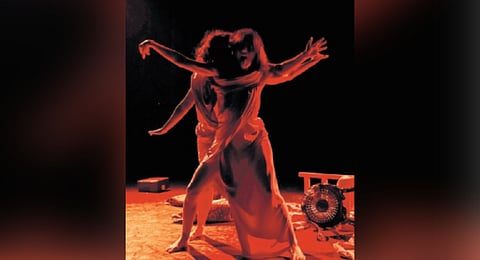

BENGALURU: Threads have long held a sense of mystique, whether in the form of the East Asian myth of the Red Thread of Fate, which binds destined individuals together, or in Greek mythology, where three sisters spin the golden thread of life. Another unique story woven within this mystical power of threads premiered in the city recently with
Unsewn, a powerful play co-created by Federica Ruggieri from Italy and Barkha Bahar from Guwahati. The theatrical production tells the stories of Durga, a garment factory worker in the East, and Eva, a domestic abuse survivor in the West.
Despite being worlds apart, the two women are connected by a shared struggle against patriarchy, symbolised by magical dresses crafted from the same fabric. “The concept of two dresses or a long piece of fabric connecting their world came to us early in the process,” says Bahar. “They meet in a limbo, a creation of Goddess Kali, where they find solidarity despite their different backgrounds.”
The collaboration between Ruggieri and Bahar began during their time at the Royal Academy of Dramatic Art (RADA) in London. “I was keen to explore themes of female rage and Indian mythology. Together, we imagined a story of women from different worlds connecting through mystical powers,” adds Bahar.
At the heart of Unsewn are the dresses, which symbolise both oppression and solidarity. Durga works under exploitative conditions in a garment factory, creating dresses like the one gifted to Eva by her abusive partner as a token of apology. “These dresses symbolise both solidarity and oppression – while produced under exploitative conditions, they create a liminal space where the women meet and support each other,” says Bahar.
The symbol of Goddess Kali is crucial. “Kali is often misunderstood as a goddess of destruction, but her rage is directed at injustice,” says Bahar. “All women carry that Kali within us – the anger suppressed by societal expectations.” Ruggieri further elaborates, “Kali destroys the demon Raktabija, whose blood gives rise to more demons by drinking the blood and going straight to the source. This reminded us of patriarchy, which persists in new forms despite efforts to fight it. Kali going straight to the source of the problem is a metaphor for dismantling systemic oppression.”
The play also attempted to challenge stereotypes, particularly the notion that Western societies are inherently more progressive. “Eva’s story highlights that oppression exists everywhere,” says Bahar. “She is a career-driven woman but trapped in a domestic violence situation, compounded by her vulnerability as an immigrant in the UK.”